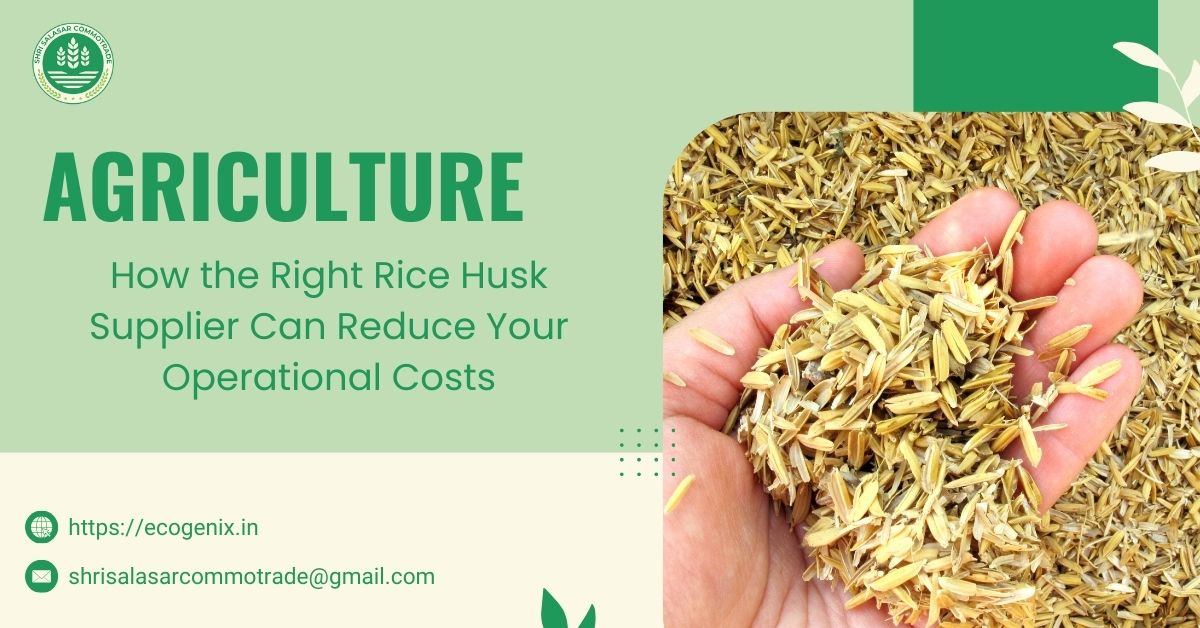Introduction
In today's fiercely competitive market, businesses across industries are constantly on the lookout for ways to improve efficiency and cut operational costs — without compromising on quality or performance. One surprisingly effective strategy is integrating rice husk, a low-cost and eco-friendly byproduct of rice milling, into your operations. But the real game-changer lies in partnering with the right rice husk supplier. A trusted supplier doesn’t just provide raw material — they become a strategic asset in helping you reduce overhead, streamline production, and boost sustainability. Here's how the right Rice Husk Supplier can directly impact your bottom line.
Understanding Rice Husk as a Valuable Resource
Rice husk, the outer shell removed during the rice milling process, has transformed from a once-discarded agricultural waste into a highly valued bio-based material. Lightweight, rich in silica, naturally insulating, and fully biodegradable, rice husk is now widely used across various industries. It serves as an efficient fuel source in biomass energy production, a cost-effective ingredient in building materials like cement, bricks, and insulation boards, and a practical option for animal feed and bedding. Additionally, it’s used as an organic fertilizer and soil enhancer in agriculture, as well as an industrial filler in rubber and plastics. Thanks to its versatility and eco-friendly properties, rice husk is increasingly being adopted by manufacturers and agricultural producers seeking sustainable and cost-efficient production solutions.
The Cost-Reduction Power of the Right Supplier
So, how does a rice husk supplier help reduce your operational costs? Let’s break it down:
1. Stable Pricing with Bulk Supply Options
A reliable supplier offers bulk procurement at stable and competitive rates. This prevents price fluctuations and reduces your dependency on costlier raw materials. Long-term supply contracts or volume discounts can help you plan budgets more accurately and ensure uninterrupted production.
2. Consistent Quality Means Fewer Defects
A poor-quality rice husk supply (with high moisture content or foreign contaminants) can damage your machinery, lower product quality, or cause processing inefficiencies. A trustworthy supplier ensures:
- Uniform particle size
- Low moisture levels
- Clean, sorted batches
- Custom processing (powder, pellets, ash, etc.)
Consistent quality leads to fewer product defects, lower machine downtime, and reduced waste, all of which cut unnecessary expenses in the long run.
3. Reduced Energy Costs in Biomass Applications
If you’re using rice husk as biomass fuel for boilers or power plants, sourcing high-calorific-value husk is crucial. A good supplier ensures the material has the right properties for efficient burning, which leads to:
- Faster heating times
- Lower fuel consumption
- Reduced reliance on fossil fuels
This shift to biomass energy using quality rice husk can drastically reduce your energy bills, especially in manufacturing or agricultural processing.
4. Lower Waste Management Costs
Rice husk’s biodegradable nature means it leaves behind less non-recyclable waste. In industries like agriculture, construction, or packaging, this translates into:
- Less landfill contribution
- Fewer disposal costs
- Easier compliance with environmental regulations
Moreover, rice husk ash — a byproduct of combustion — is reusable in concrete or as fertilizer, making it a nearly zero-waste material.
5. Time Savings and Streamlined Logistics
Time is money. The right supplier offers on-time deliveries, proper documentation, and responsive customer support. This helps prevent:
- Production delays due to material shortages
- Storage issues from last-minute procurement
- Administrative overhead from chasing orders
With a professional supplier, you can focus on core operations rather than solving supply chain hiccups.
6. Helps You Meet Sustainability Goals (and Save Money Doing It)
Going green isn’t just good for the planet — it's also good for your balance sheet. When you use renewable resources like rice husk, you may qualify for:
- Green tax credits or carbon offsets
- ISO certifications or environmental awards
- Opportunities in eco-conscious markets
All of this enhances your brand value, attracts new clients, and opens up new business avenues — while lowering compliance and environmental costs.
Industries That Can Benefit the Most
Many sectors are already leveraging rice husk to slash costs and boost productivity:
- Textile & Paper mills – use rice husk for biomass-powered steam generation
- Cement & brick manufacturers – use rice husk ash to reduce cement usage
- Plastic and rubber industries – use it as an affordable filler
- Agro-based industries – use it as feed or soil amendment
- Packaging companies – use rice husk as a sustainable material for containers
In all these areas, having the right supplier ensures material compatibility, reliability, and efficiency.
What to Look for in a Rice Husk Supplier
When integrating rice husk into your operations, choosing the right supplier is key. Look for one with industry experience, quality certifications, and the ability to provide customized formats. Ensure they offer transparent pricing, bulk handling, and follow sustainable, ethical sourcing. A reliable supplier won’t just deliver materials—they’ll help you cut costs and boost long-term efficiency.
Conclusion
Reducing operational costs isn’t always about slashing expenses — it’s about making smarter choices. Choosing the right rice husk supplier gives you access to a versatile, cost-effective, and sustainable raw material that aligns with your business goals. Whether you’re in energy, construction, manufacturing, or agriculture, rice husk is more than just a byproduct — it’s a strategic resource. And when sourced correctly, it can help trim costs, boost efficiency, and elevate your product value.





Comments